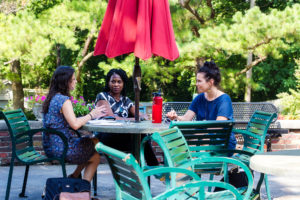Master Plan: A Human-Centered Overton Park
It’s here: the first master planning process for Overton Park in three decades is officially underway.
As Overton Park Conservancy and the City of Memphis Division of Parks & Neighborhoods kick off this process using human-centered design principles (more on that in a minute), we’re keeping three questions in mind:
- How can we make the park equitable for all Memphians?
- How can we honor the historic and present uses of the park while anticipating the future needs of our community?
- What would make Overton Park financially sustainable?
These questions touch on the health and progress of Memphis as a city, the ways people incorporate public space into their lives, and the challenge of maintaining and enhancing a resource that doesn’t generate admission fees. They’re big questions, and we aren’t going into this process assuming we have the answers. That’s why we’re using human-centered design–a process that begins with the people who are affected by the outcome of a project and generates solutions based on their input.
In our case, that means that we’re not starting out with concrete ideas of where the park should go, whether that relates to improving access, potential park programming, or what should be done with the soon-to-be-vacant City maintenance area at the park’s southeast corner. It means we’re starting conversations in the community to see what’s really important to the people who regularly visit the park–and to those who don’t, so we might understand what barriers we need to overcome to truly welcome everyone.

We’re beginning these conversations by talking to a few people about a lot of things, and we’ll continue by talking to a lot of people about a few things. The initial interviews with subject matter experts–representatives of neighborhood associations, recreational groups, and community organizations–will give us some major threads to bring to larger groups for discussion. As we begin to see some common themes emerge, we’ll have opportunities for the larger community to engage with these ideas, including an interactive exhibit at our Day of Merrymaking festival on October 6.
Park visitors–current and potential–are at the heart of this process. In the coming weeks, we’ll be setting up in the park and other locations around town to ask for your input on all things park-related. Make sure you have Day of Merrymaking on your calendar, as we’ll have some preliminary concepts for you to respond to. And if you’re not already on our e-mail newsletter list, please sign up so we can give you the specifics about when and where we’re hosting #ParkConversations.
Later this week, we’ll introduce you to the team that will be having these conversations, because you’ll be seeing a lot of them in the months ahead. We’re excited to learn what the community needs from the park and to work with you on achieving those goals.



